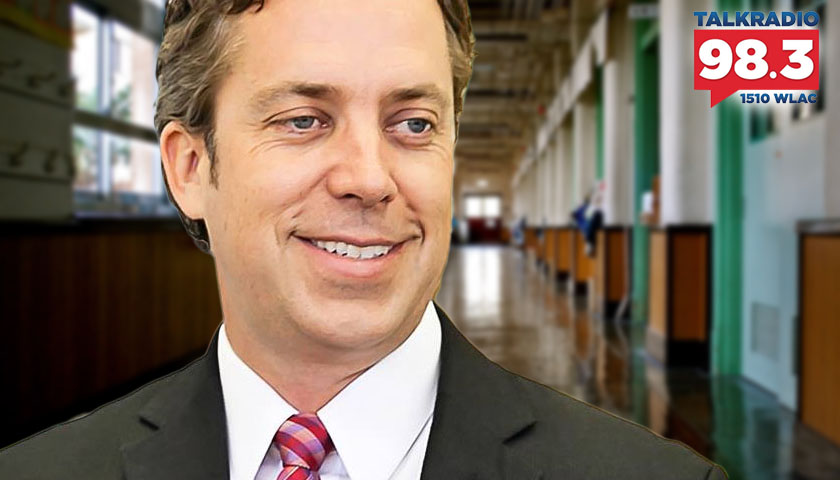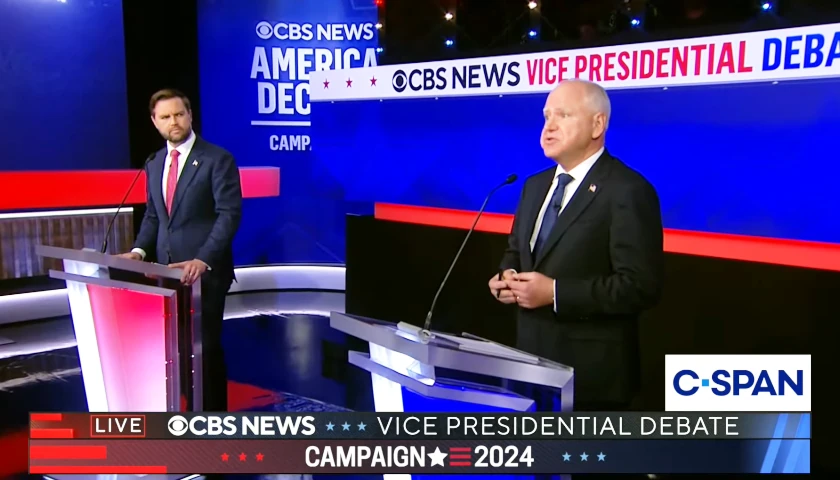Live from Music Row Tuesday morning on The Tennessee Star Report with Michael Patrick Leahy – broadcast on Nashville’s Talk Radio 98.3 and 1510 WLAC weekdays from 5:00 a.m. to 8:00 a.m. – host Leahy welcomed Maury County Mayor Andy Ogles in the studio to explain the relationship between public schools and county commissions and the necessity for clear communication.
Leahy: We are joined in-studio by the Mayor of Maury County, that bastion of freedom, that turbocharged engine of economic growth, Andy Ogles. Andy, it was interesting, Johnny Garrett, the majority whip of the Tennessee House of Representatives, always a great interview. Very good guy.
There was something, though, there that caught my attention about this new Basic Education Program formula and I want to see if you have a thought on it. He said that the governor has tried to reach out to stakeholders, and we’ve tracked this.
Penny Schwinn, the commissioner of education, has held these meetings around the state. Eight or so. And we’ve sent reporters there and documented them. These were meetings that basically they wanted ‘public input.’
Most of the people who attended those meetings were either teachers or administrators. And the theme was to give us more money. That was the theme of those meetings. Didn’t see a lot of parents at those meetings.
And also you’re talking about stakeholders. I was looking at the numbers here, and typically what happens is, broadly, for all of these 140 local education agencies around the state, of which Maury County Public Schools is one of these: 141.
Funding for these local school systems, K-12, typically is about 10 percent from the federal government – asterisk. About, I don’t know, 50 percent from the state and about 40 percent from the local counties. But that will vary, right?
Some counties pay more than 40 percent, some, say, less. It would seem to me that in terms of stakeholders, explain a little bit about how county commissions, to me, are a big stakeholder here.
And then what kind of inquiry have you received from the governor and from Penny Schwinn about your input as a stakeholder?
Ogles: As you said, they’ve had these “stakeholder” meetings across the state. There was actually one in Maury County, which, again, largely teachers and folks participated. But the question, and I think it’s a valid one, is when you look at Maury County, which is one of your fastest-growing counties in the country, [it] represents a kind of a cadre of what you would call, ‘growth counties’ for the state of Tennessee.
You would think that we would have been brought in kind of at that next level of engagement to look at our budget and how might a formula impact a county growing as fast as we are. And I can honestly say that we were not.
Leahy: They didn’t reach out to you.
Ogles: No.
Leahy: As a stakeholder, the County Commission, and the Mayor.
Ogles: That’s right.
Leahy: And explain to our audience how the county portion of the funding takes place between the Maury County Public Schools and the Maury County Commission.
Ogles: In the state of Tennessee your county commissions are your funding body for your school systems. And so that money is then moved, allocated over to the school system, and then the management of those dollars is then delegated to the school board and the superintendent.
But your county is actually your funding body. So whether or not you have enough money to build a school, additional programs, that all comes from the County Commission. And those decisions are made at the County Commission level.
Do you increase revenue by increasing taxes? Do you cut monies from the county’s budget to move money over to the school’s budget? That kind of thing? And again, unfortunately, we were left out of that conversation at that next level that would have been, I thought, very helpful to give some insight from a very practical standpoint.
Because we’re growing fast. It’s a blessing and a curse, right? We’ll be building a school every two to three years in perpetuity, and yet we’re a smaller rural county compared to, say, a Williamson or a Rutherford county.
Leahy: One of the criticisms that I’ve heard in other counties, I don’t know if it’s specific to Maury County, let’s say Davidson County right now, the Metro Council will vote on a budget and for Metro Nashville Public Schools.
And the Metro Nashville Public Schools take some money, and they often spend it in ways very different than the budget they present to Metro Council. Is that a problem everywhere or just in Metro Nashville?
Ogles: No, it can be a problem because, again, going back to state law, there’s a firewall between your funding body, which is your county commissions, or in that case, the council and the school board. But that’s where you build up trust.
We had a situation in Maury County just prior to me being elected, where there were some monies allocated for some deferred maintenance, and not all of that money was used for what it was allocated for. But once that money is given over to the school board, then they have total purview. So they can go buy whatever with it.
Leahy: They can tell the County Commission, we’re going to use it for deferred maintenance, but then they could use it to buy, I don’t know, candy bars or something.
Ogles: Whatever they want.
Leahy: Whatever they want.
Ogles: But there’s an accountability – one, with the voters –but then also secondly, when they come back the next time asking for additional funds or discretionary funds of – hey, now, wait a minute, you sold us one thing last time, and now you want us to believe this again. We’ve had a good rapport between this County Commission and this school board.
Leahy: How was that issue of trust resolved?
Ogles: Better communication.
Leahy: By better communication.
Ogles: Communication.
Leahy: Well, that’s good. How does that happen in Maury County but apparently doesn’t happen at all in Metro Nashville or even Williamson County, from what I can tell? Here’s my impression of it.
They come in, the school board will come in, the superintendent will come in and say “here’s the budget, give us all this money, or you hate children.” Right?
Ogles: (Chuckles) Right.
Leahy: And so the county commissioners go hubada hubada hubada. They look over the budget and they just give them the money. That seems to be like a dreadful way to do it, myself.
Ogles: Again that gets back to communication. As county mayor I hold veto authority over the budget and so part of that is communicating to the commissioners, what’s palatable to me communicating to the school board of “hey, this is the number we can afford.”
You can ask for whatever you want but at the end of the day, this is all we can afford. And that’s worked well in Maury County but part of that gets back to that good old-fashioned sitting down and having honest open conversations.
Just before COVID, they asked for 12 school buses. We could only afford about half that many. And so going through their inventory of what they really needed to roll off of our inventory and age-out versus what they were wanting, but yet still keeping us on the type of schedule.
And by having those conversations it’s worked well. And again with a county like Maury County where our revenues are much smaller than a Williamson or Rutherford County, we have to mind every single penny. We’ve got to stretch every penny. And so we’re forced to communicate. We don’t have time to play games.
Leahy: One of the themes of your leadership there seems to me is this idea of honest open communications. So often in politics now we see situations where the circumstances are portrayed as somebody has a point of view and they want to accomplish something, they present themselves as the personification of good and then their opponents they characterize as evil. I see that all the time, particularly when you look at the debates over these mask mandates that Metro Council has imposed and the school board has imposed in Nashville.
But the parents get up there and most of the Metro school boards try to characterize the parents presenting a legitimate complaint as evil or whatever. It seems to me that’s not your style at all. And it seems to me it works pretty well. What are your thoughts on that?
Ogles: I think setting expectations on the front end is important. There are some things that we would love to fund in Maury County for the schools but we just can’t afford it quite yet.
And I just always liken it to how you might manage a household. There are certain things that I want and there are certain things I need and you take care of your needs first and then you save accordingly.
If you look again at Maury County, we’re a fast-growing community so our public safety sector has been a big priority of mine. We’ve built two fire halls. We just completed one.
We’re about to build another one but part of that, of getting this next one, is we’ve been saving over the last three years in anticipation for this project. We had a strategic plan on where we needed to be and how we were going to get there. And again, communication is key.
– – –
Tune in weekdays from 5:00 – 8:00 a.m. to The Tennessee Star Report with Michael Patrick Leahy on Talk Radio 98.3 FM WLAC 1510. Listen online at iHeart Radio.






There may be some amount of accountability as to how school funds are spent in Maury County, but there is absolutely none in Sumner County. Direct of Schools Del Phillips just does as he pleases while the School Board and County Commission members rubber stamp anything he wants money-wise including humongous budget increases each year. It sounds great to be able to remove elected officials, but it rarely happens to incumbents, and they are the ones driving us citizens to the poorhouse. The ability to recall these imbeciles might work because action could be taken when they stab taxpayers in the back. But by the time the next election rolls around many have forgotten what these bureaucratic fools did six months earlier because they have to take care of their jobs and families. That is just human nature. But I for one will not forget.